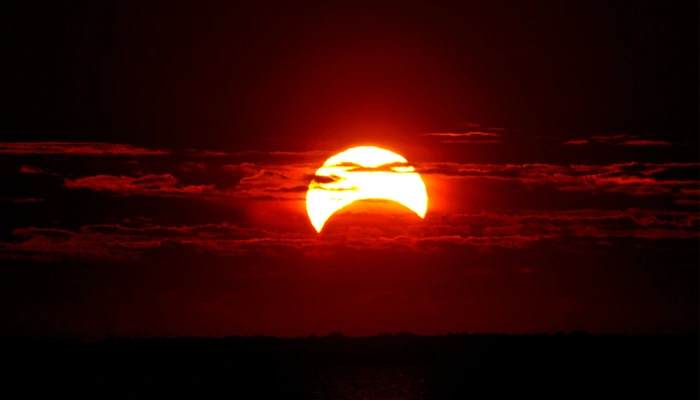Annular Solar Eclipse Forecasted for October 2-3, But Not Visible in Pakistan
The event will begin with a partial solar eclipse starting at 20:43 PST on October 2. As the eclipse progresses, it will reach its totality at 21:51 PST.

KARACHI: The Pakistan Meteorological Department (PMD) announced on Monday that an annular solar eclipse will occur on October 2-3. However, the Met Office clarified that this spectacular astronomical event will not be visible from Pakistan.
The annular solar eclipse will provide a stunning view for those located in South America and parts of North America, as well as in the Pacific, Atlantic, and Antarctica. These regions will experience the full beauty of the eclipse, while observers in Pakistan will miss this celestial display.
The event will begin with a partial solar eclipse starting at 20:43 PST on October 2. As the eclipse progresses, it will reach its totality at 21:51 PST. The maximum phase of the eclipse will occur at 23:45 PST. The total eclipse will conclude at 01:39 PST on October 3, and the partial eclipse will fully disappear by 02:47 PST.
Read: Earth to Capture a Mini-Moon: Asteroid 2024 PT5
Astronomers describe an annular solar eclipse as a phenomenon where the moon obscures the sun’s center, leaving a bright ring, or “annulus,” visible around the edges. This unique display occurs when the moon is too far away from the Earth to completely cover the sun.
The PMD encourages astronomy enthusiasts and the general public to observe the eclipse safely in regions where it will be visible. They recommend using appropriate solar viewing glasses or indirect viewing methods to protect eyes from the sun’s harmful rays.
Read: Government Cuts Petrol Price by Rs 2.07 per Litre
While this eclipse may not be visible in Pakistan, it serves as a reminder of the wonders of our solar system. Such events highlight the importance of astronomical research and the need for proper education about celestial phenomena. The PMD continues to promote awareness of such occurrences, even for those unable to witness them firsthand.
While Pakistanis will not see the annular solar eclipse on October 2-3, it remains an exciting event for millions worldwide. Observers in the viewing areas will be treated to a breathtaking spectacle, while the rest of us can look forward to future astronomical events that will grace our skies.
Follow us on Google News, Instagram, YouTube, Facebook,Whats App, and TikTok for latest updates












